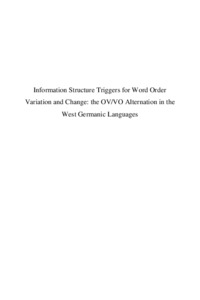|
Information structure triggers for word order variation and change: the OV/VO alternation in the West-Germanic languages
Struik, Tara
![[img]](https://madoc.bib.uni-mannheim.de/63438/1.hassmallThumbnailVersion/616_fulltext.pdf)  Vorschau |
|
PDF
616_fulltext.pdf
- Veröffentlichte Version
Download (2MB)
|
|
DOI:
|
https://doi.org/10.48273/LOT0616
|
|
URL:
|
https://www.lotpublications.nl/information-structu...
|
|
URN:
|
urn:nbn:de:bsz:180-madoc-634389
|
|
Dokumenttyp:
|
Dissertation
|
|
Erscheinungsjahr:
|
2022
|
|
Ort der Veröffentlichung:
|
Amsterdam
|
|
Verlag:
|
LOT
|
|
ISBN:
|
978-94-6093-401-8
|
|
Hochschule:
|
Radboud University Nijmegen
|
|
Gutachter:
|
van Kemenade, Ans
|
|
Sprache der Veröffentlichung:
|
Englisch
|
|
Einrichtung:
|
Philosophische Fakultät > Anglistik IV - Anglistische Linguistik/Diachronie (Trips 2006-)
|
|
Fachgebiet:
|
400 Sprache, Linguistik
420 Englisch
439 Andere germanische Sprachen
|
|
Freie Schlagwörter (Englisch):
|
OV/VO variation , West Germanic , phases , information structure , scrambling
|
|
Abstract:
|
The West-Germanic language family is characterized by a remarkable variation in word order. The continental varieties, including Dutch and German, have largely Object-Verb (OV) word order, whereas English has strict Verb-Object (VO) word order. It is intriguing that such closely related languages show such a fundamental word order distinction, the more so when considering that the older stages of the languages show varying mixtures of OV and VO word order. This variation raises many questions regarding its motivation and its syntactic status, both from a synchronic and diachronic perspective.
This thesis approaches OV/VO variation from a comparative and diachronic perspective, building on the hypothesis that OV/VO variation is motivated by information structure. By means of a series of detailed corpus studies on the earlier stages of English, Dutch, Low German and High German it shows that - while the variation in earlier English, Dutch, and German is structurally similar - the way that information structure governs the OV/VO alternation in the earliest attested language stages already signals the difference between English as a VO language, and Dutch and German as an OV language; in early English VO is the pragmatically neutral word order, whereas in early Dutch and German OV is pragmatically neutral. These findings feed into a novel antisymmetric analysis, in which the variation is derived in the same way for all West-Germanic languages, but which is flexible enough to allow for variation between the individual languages.
|
 | Das Dokument wird vom Publikationsserver der Universitätsbibliothek Mannheim bereitgestellt. |
 | Dieser Datensatz wurde nicht während einer Tätigkeit an der Universität Mannheim veröffentlicht, dies ist eine Externe Publikation. |
 Suche Autoren in Suche Autoren in
Sie haben einen Fehler gefunden? Teilen Sie uns Ihren Korrekturwunsch bitte hier mit: E-Mail
Actions (login required)
 |
Eintrag anzeigen |
|
|
